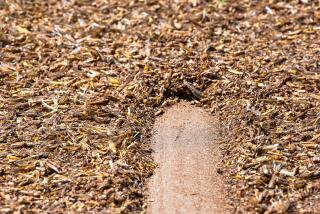THE CALIFORNIA DROUGHT : Strawberry Crop Being Attacked From Air
OXNARD — The strawberry fields of Ventura County have come to life in recent weeks with the sound of rocket fire, detonation bombs, whistles, police sirens and clanking pots and pans.
Adding to the general din are the shouts and screams of farm workers and a musical background of Mexican ranchera songs blasting from radios set at full volume.
The noises are not meant to terrorize the workers, but to scare off birds that descend on the fields in search of food.
It is this way every year at the start of the harvest season. And in this, the fifth consecutive drought year, the fields are noisier than ever.
“We try everything, but the birds just won’t go away,” said Emilio Ramirez, 31, a foreman at the Wagon Wheel field in Oxnard, which has one of the worst problems in the county. “It doesn’t rain and there’s no food in the mountains, so all the birds come down here and eat until they’re full.”
The food shortage problem is not just for the birds.
Roger Rees, California Department of Fish and Game supervisor for Ventura and Santa Barbara counties, said the drought is forcing all kinds of wildlife to move into agricultural areas in search of food and water.
But in Ventura County, it’s the birds that have been especially pesky.
The effect of the drought on birds is twofold.
“First of all, a lot of the water sources in the wilderness have dried up,” Rees said. “Also, the drought is killing off the plants which produce the seeds that birds feed on. And the drought has affected the vegetation that serves as food for the insects that birds eat,” Rees said.
Since there aren’t enough beetles to go around, the birds have determined that strawberries, and other fruits, are a tasty substitute.
Farmers and pickers estimate that as much as 30% of the January and February crop in the county has been lost to birds despite unprecedented efforts to chase them away.
In some fields, the crew of pajareros , or bird chasers, has been doubled from years past. To complement the sound devices, growers are increasingly turning to fishing nets and nylon covers to protect the fields, and model airplanes are being flown to frighten the intruders away.
But nothing seems to work.
“We shoot rockets at them and they just duck and go on eating,” said Pedro Valenzuela, one of nine bird chasers working full time on the 190-acre Wagon Wheel field.
The pajareros ‘ worst enemies come in two sizes: big, yellow-chested meadowlarks, which operate alone, and tiny sparrows that attack in flocks.
The larks like to bite off the ripe edges of the fruit while leaving the rest to rot. The sparrows bite off strawberry seeds, which causes the fruit to dehydrate and burn.
Conventional bird-chasing methods have proven completely ineffective, field workers say.
“In the first week of the harvest we put up scarecrows, and the birds stayed away from them,” said pajarero Carlos Ramirez as he drove a flatbed truck around the fields with a police siren going full blast. “But they figured out real quick that they’re not real people, and now they just use the dummies as resting sites.”
Ramirez loaded his pistol with a 15-mm Moog Screamer Siren rocket and fired it toward a scarecrow. The rocket made a sound sort of like a screaming vulture, but the birds didn’t seem to mind. A few flew 50 yards, landed on another patch, and continued their meal.
No sooner had they landed than Felipe Carrillo, 27, started running toward them, whistling and waving a sports coat.
“This is kind of fun and it beats picking strawberries,” Carrillo said. “But sometimes I can’t feel my feet from so much running and walking.”
At the Wagon Wheel field, bird chasing is an 11 hour-a-day job.
“It doesn’t matter what you throw at them,” said Wagon Wheel Ranch owner Mike Serro. “When the birds are hungry, they just won’t move.”
Since the bird wars started, farm workers have had to discard some of their weapons. Three years ago, for example, workers at the Wagon Wheel field stopped killing birds with shotguns.
“There were a few incidents, so the patron (field owner) stopped giving us live ammunition,” Ramirez said.
Last month, Serro also banned propane detonator noise bombs at Wagon Wheel after nearby residents--some of them jittery because of the Persian Gulf War--asked the farmer to put an end to the thundering practice.
Serro is especially excited about the latest addition to his arsenal, the remote control model airplane.
“We use them to follow the birds around until they leave the fields,” he said.
“The birds always come back, but we’re able to get rid of them for a while.”
Still, even with his new weapon, Serro said he is getting desperate.
“Birds have always been a problem,” he said, “but nobody knew it would get this bad.”
More to Read
Sign up for Essential California
The most important California stories and recommendations in your inbox every morning.
You may occasionally receive promotional content from the Los Angeles Times.










